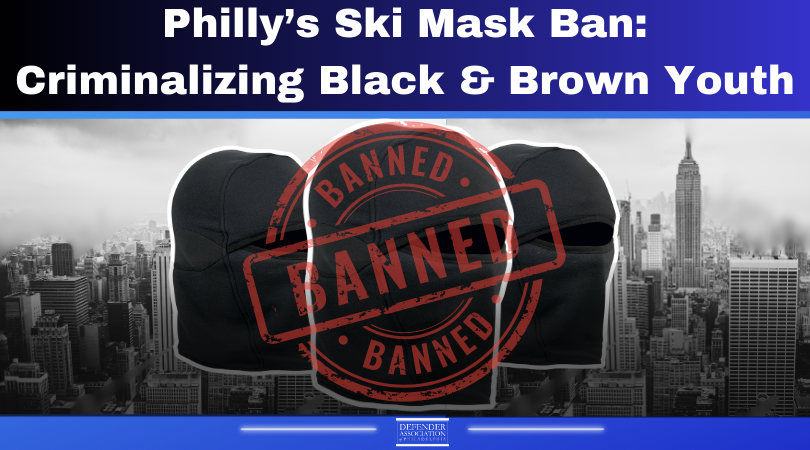The Defender Association of Philadelphia represents over 70% of the people arrested for crimes in the City of Philadelphia. Most of our clients are Black and Brown people, and all of them are poor enough to qualify for the free legal services we provide.
Op Ed: Philly’s ski mask ban is meant to deter crime. It won’t.
Our child and young adult clients are 90% Black, and represent a majority of the young people who would be impacted by Philadelphia’s new legislation banning the wearing of ski masks in some public locations. As the agency who represents the population being targeted by this legislation, the Defender Association is opposed to Philadelphia’s ski mask ban.
Our experience as justice system stakeholders tells us that these kinds of “dress code” solutions are ineffective crime deterrents. Worse, they establish an additional pretext for law enforcement to surveil young people of color, and will funnel more of our city’s youth into the justice system, which will almost surely compromise their socioeconomic futures.
The Problem
Philadelphia and other cities are under an imperative to find solutions to violent crime, retail theft and other criminogenic activity that often involves young people. For years, in an effort to respond to the concerns of constituents, business owners and neighborhood residents, some elected officials have historically sought to combat these issues by trying to legislate aspects of behavior, such as the way young people dress or congregate. Philadelphia’s new law banning ski masks in certain public spaces is an example of this misguided thinking.
Not an effective crime deterrent
There is a complete absence of any research conducted after 1980 that suggests these types of laws are effective at reducing crimes committed by or against young people. Philly’s ski mask ban is likely to yield the same public safety results as similar policies that criminalize ordinary youthful behavior, like being in public after hours or standing in small groups. These are knee-jerk polices policies that, while popular, have never been a meaningful solution to youth crime or victimization.
Unintended negative long-term consequences
One of the immediate negative impacts of the ski mask ban is that it will subject the families of young people in Philly–the nation’s poorest big city–to hundreds of dollars in fines for what is essentially a dress code violation.
In the long term, criminalizing the behaviors and wardrobes of young people, these policies have the unintended effect of increasing the number of interactions between youth and law enforcement, as they give additional reasons for police to interact with young people in an investigatory manner for behavior that isn’t even criminal on its face. This kind of monitoring invites a doubling down on surveillance tactics (e.g. drones, facial recognition, etc.) that will likely be deployed in poor Black and Brown communities.
In the end, this legislation will expose more young people to the traumatic, and often permanent, damage that can be caused by our justice system.
Overlooking root causes–and impacts of crime in communities
Many of our young clients have told us that they wear ski masks, not with the intention of committing a crime, but because they are, quite simply, fashionable at the moment.
On a darker note, many of our clients have shared that they wear them at times because they’re afraid of being recognized by other people who intend to do them harm. At best, this trauma is callously ignored by laws that focus on the ski mask itself instead of examining why our young people choose to wear them. At worst, these policies can be viewed as a nod to commercial interests who prioritize profits over the rights of Black and Brown youth.
Clothing and accessories are not major contributors to crime.
One of the many reasons “dress code” laws don’t work is because they fail to address the range of complex factors that contribute to acts of crime and violence. Most of our youth clients we represent have also been victims of violent crime, or live in areas heavily impacted by violence.
The Defender Association advocates for public safety solutions that emphasize mitigating the effects of poverty, such as housing instability, food insecurity, and lack of access to education. These conditions do far more to foster criminal activity than access to ski masks.
Rather than short-term, band-aid responses to crime, we advocate for sustained investment in solutions that will ensure our young people have enough food to eat; a good education and access to healthcare; mental health counseling; and other programs that will allow them to feel safe in their homes and communities.
Examples of more effective youth justice legislation:
Legislation like the ski mask ban represents a backward step for justice system-involved young people. There are examples of legislation that more effectively addresses juvenile justice reform. One example is HB 1381, which is being considered by lawmakers in Harrisburg. This legislation would:
- expand opportunities for youth to be diverted away from the criminal legal system;
- eliminate fines and fees including escalating financial penalties for non-compliance; and
- increase protection for youth subjected to police interrogation by safeguarding their constitutionally guaranteed rights to counsel and to remain silent;
HB 1381 represents an approach that acknowledges the need to reduce the number of adjudicated youth. Laws like the ski mask ban take the opposite approach by bringing more young people into a rigid and often traumatizing judicial system.










